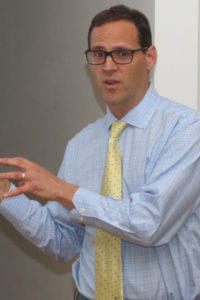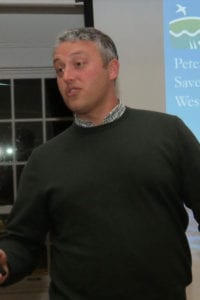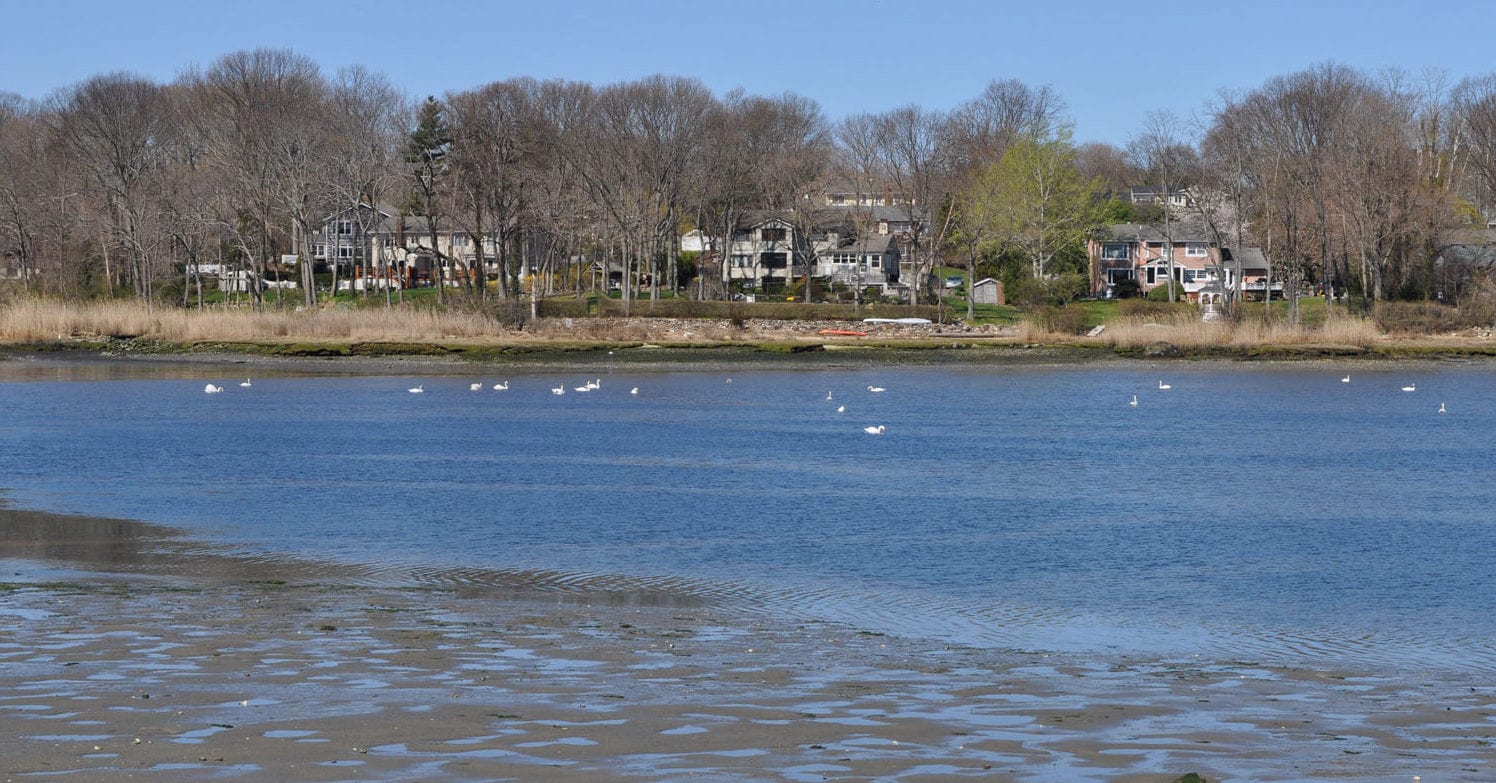By Susan Risoli
The Setauket Harbor Task Force gave an update recently to the community about its ongoing efforts to protect Setauket Harbor and the surrounding shoreline. Approximately 70 people came to the task force’s third annual meeting, held at the Setauket Neighborhood House April 19.
“How Clean Is Setauket Harbor?” was the title of a talk given at the meeting. The goal was to give people the opportunity to learn about the health of the harbor and find out what the task force is doing about it.
Setauket residents who noticed the harbor was struggling founded the volunteer, nonprofit organization in 2014, said task force board trustee George Hoffman at the meeting.

“Sometimes the water looked cloudy,” Hoffman said. “There were a lot of algae blooms. We knew that nobody was really speaking out for Setauket Harbor.”
Now the task force wants to partner with the organization Save the Sound, Hoffman said, to create a citizen-scientist, water quality monitoring program in Setauket Harbor. Local volunteers, trained by Save the Sound personnel, would start taking water samples next spring and work through October.
Peter Linderoth, water quality program director for Save the Sound, spoke at the meeting about his organization’s Citizen Science Unified Water Testing program to begin this summer in some Long Island Sound harbors and bays. Twice a month, he said, volunteers will record precipitation data; look at water clarity, seaweed and eelgrass; and track levels of dissolved oxygen, chlorophyll, salinity and temperature.
The Setauket program would be similar, Hoffman said in a recent phone interview. He said the cost of training volunteers would be covered by the Long Island Sound Funders Collaborative, a group of funding organizations that pool their resources to help protect the Sound. The water quality monitoring equipment will be provided through a grant Save the Sound obtained from the U.S. Environmental Protection Agency, Hoffman said.
About a dozen volunteers have already signed up to monitor water quality in Setauket Harbor, and the task force is looking for more, Hoffman said.
The April task force meeting also addressed a DNA analysis of pathogens in Setauket Harbor. The harbor is closed to shell fishing due to high numbers of disease-causing bacteria associated with human and animal waste.
Lorne Brousseau, marine director for Cornell Cooperative Extension, said the six-week study — commissioned by Brookhaven Town and conducted last fall — revealed that “birds seemed to have the biggest impact” on numbers of coliform in the water, with Canada geese being the worst offenders. The second highest source, Brousseau said, was “human-derived fecal coliform.”
“Where that came from, we’re not sure,” he said. “It could be boat discharge or septic systems.”
Brousseau also said there was a “low proportion of domestic animal fecal coliform – a few dogs and one horse.”
A man in the audience asked if it were possible to determine what percentage each source contributed to the total fecal coliform in the harbor. Brousseau said many more samples, taken from the water many more times, would have to be obtained to come up with percentages.
“It’s cost-prohibitive and time-prohibitive,” he said.
Brousseau also said fecal coliform in Setauket Harbor increases, and water quality deteriorates, after a rainfall.
“After it rains, the numbers triple, quadruple, sometimes more,” he said.
Task force chairperson Laurie Vetere also spoke at the meeting. She said funds from a $1 million state grant to fund water quality improvement in Setauket Harbor and its watershed are expected to become available soon. The grant, announced last fall, was secured for Brookhaven Town by Senator John Flanagan (R-East Northport), working with Assemblyman Steve Englebright (D-Setauket.)

The town will use the funds to remove accumulated silt at the entrance to the harbor, renovate the town dock on Shore Road, and continue managing storm water, Vetere said. The grant “was a huge deal, and we’re hoping that money comes in sooner rather than later,” she said. She also said Brookhaven Town employees have recently been cleaning brush and debris from the Setauket pond park next to the Se-Port Deli.
Vetere said in a recent phone interview that the DNA pathogen analysis was an important source of baseline data.
“Even in dry weather, there have been very high levels of bacteria in the harbor,” she said. “We’re not really sure where that’s coming from, but we’re going to be addressing it.”
Vetere also said the Setauket Harbor Task Force will seek ways to work with Suffolk County on its new Septic Improvement Program, a grant and loan program to help homeowners replace outdated septic tanks with nitrogen-reducing septic systems.
Vetere said storm water runoff is an issue for Setauket Harbor. Last November, she said, five task force members piled into a car and drove around the harbor “and just watched how storm water was coming down the streets.” The task force is exploring if it would be effective for homeowners around the harbor to plant passive rain gardens, Vetere said, because the gardens soak up storm water and absorb pollutants.
The Setauket Harbor Task Force will hold its annual Harbor Day — environmental exhibits, kayaking and paddleboard lessons, entertainment and other activities — Sept. 23 at the town dock on Shore Road.
For more information about the Setauket Harbor Task Force and future meetings, call 631-786-6699.







